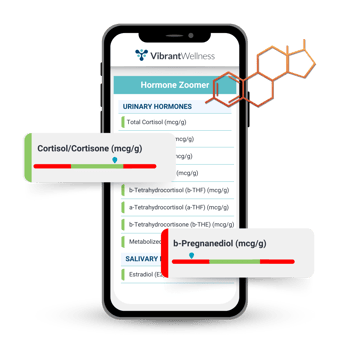
Gut health extends far beyond digestion. Its microbiome plays a key role in immune regulation, hormone metabolism, and detoxification. When gut function is impaired, the ripple effects can impact multiple systems.
More than 70 percent of immune cells reside in the gut, underscoring the significant role the gastrointestinal tract plays in immune function. Microbial imbalances can promote inflammation and increase autoimmune risk. The gut also influences hormone balance through enzymes like beta-glucuronidase, which can affect estrogen clearance and contribute to symptoms like PMS or bloating.
In detox pathways, the gut and liver work together to process toxins and regulate bile acid metabolism. Disruptions here can lead to poor toxin clearance and increased sensitivity to environmental exposures.
Studies have shown that individuals with chronic fatigue syndrome and related conditions often exhibit significant gut microbiome imbalances, such as reduced butyrate-producing bacteria and increased gut permeability. These shifts can impair detox, trigger immune dysregulation, and disrupt the gut-brain axis.
These findings reinforce the gut and immune connection and highlight the importance of advanced stool testing for resolving root causes.
Inside the New Gut Zoomer: What Sets It Apart
Comprehensive Microbial Detection
The new Gut Zoomer expands well beyond traditional stool testing. It identifies not only bacteria but also archaea, fungi, viruses, protozoa, and helminths. Including 150 beneficial bacteria and 76 harmful species, this panel reveals both microbiome richness and potential pathogens. Clinically relevant strains such as Faecalibacterium prausnitzii and Akkermansia muciniphila are identified to help assess gut barrier integrity, inflammation, and metabolic health.
Pathogen detection includes hard-to-catch infections like non-H. pylori Helicobacter and Edwardsiella tarda, plus insights into antibiotic resistance. These additions make the Gut Zoomer a go-to test for unexplained GI symptoms, immune dysfunction, or chronic inflammation.

Functional Gut Health Markers
This panel now integrates advanced biomarkers that reflect immune activity, inflammation, and digestive performance. Markers like calprotectin, beta-defensin 2, and eosinophil protein X offer insight into gut-driven immune responses and allergic inflammation.
Digestive markers such as pancreatic elastase, secretory IgA, zonulin, and fecal pH give a full picture of enzymatic function, gut permeability, and mucosal defense. Providers can use this data to guide protocols for leaky gut, IBD, and food sensitivities.
Metabolites, Diversity, and Detox Clarity

Gut metabolite analysis is a new highlight of the panel. It includes short-chain fatty acids like butyrate, which support gut repair and glucose regulation, and beta-glucuronidase, a critical marker for detox and estrogen metabolism. Elevated beta-glucuronidase may indicate microbial patterns that promote estrogen dominance and poor toxin clearance.
Microbiome diversity is assessed using indices like Shannon and Simpson, and key ratios such as Firmicutes to Bacteroidetes help identify dysbiosis. Together, these metrics guide targeted interventions for gut restoration and systemic balance.
Translating Data into Action with the New Sample Report

The redesigned Gut Zoomer report makes clinical insights easier to access and apply. It organizes microbial, inflammatory, digestive, and detox markers into a clear, prioritized format. Visual flags and concise summaries help connect findings to protocols more efficiently.
Each report section is aligned with common bundle themes—nutrient needs, immune status, hormonal balance, and detox function—giving providers a roadmap for multi-panel interpretation. This structure also improves patient understanding and adherence, supporting more collaborative, informed care.
Explore the full sample report in the walk-through video.
Who Should Use the Gut Zoomer?
The Gut Zoomer is ideal for patients with ongoing GI complaints, unexplained fatigue, hormonal imbalance, autoimmune patterns, or detox-related symptoms such as skin issues or chemical sensitivity. It’s also recommended for individuals who haven’t responded to conventional treatment or whose symptoms return without a clear explanation.
In preventive care, this panel helps identify microbial imbalances and functional vulnerabilities early. It’s particularly valuable for patients with a family history of autoimmune disease, inflammatory bowel conditions, or metabolic dysfunction, where early intervention can transform outcomes.
And for providers focused on root-cause resolution, the Gut Zoomer offers foundational insight that supports protocols targeting hormone metabolism, immune modulation, and environmental detoxification.
Case Study: Connecting Gut Health to Hormonal and Detox Issues






 Clarifying Chronic Inflammation and Autoimmune Triggers
Clarifying Chronic Inflammation and Autoimmune Triggers Supporting Detox Pathways and Skin Health from the Inside Out
Supporting Detox Pathways and Skin Health from the Inside Out 


.png)

.png)


